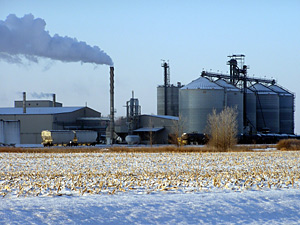Audio
Photos
More from MPR
Resources
| ||||||||||||||||||||||||||||||||||||||
February 15, 2005
 |
| Supporters of the ethanol bill say the higher mandate will increase demand for Minnesota corn and create jobs in rural Minnesota. This plant is in Bingham Lake, Minn. (MPR Photo/Mark Steil) |
St. Paul, Minn. — The 20-percent-ethanol mandate breezed through the Minnesota Senate, where it passed 54-to-12 last week with little debate.
Gov. Pawlenty supports the bill, and it has cleared two House committees. But there is opposition to the bill on a couple of fronts. The oil industry opposes mandating ethanol content, and the automobile industry questions the impact on cars.
Sandy Neren, of the Alliance of Automobile Manufacturers, says warranties won't cover cars that use the "E-20."
"At the present time, the way cars are manufactured right now, we can't extend the warranty to E-20. And the simple reason for that is, we've never tested it, we don't know what will happen," she said.
Neren points out that the sale of E-20 is illegal; Minnesota would need to get a federal waiver to sell the higher ethanol content gasoline. The bill's supporters say they're confident Minnesota would get a waiver.
Some DFL lawmakers are also raising environmental concerns. In the House Environment and Natural Resources Committee, Rep. Carlos Mariani, DFL-St. Paul, questioned whether more ethanol would mean more use of Atrazine by corn growers. He says studies have linked the weed killer to frog deformities, and he worries it may be seeping into the state's groundwater.
"We do know that atrazine is being used in at least half of our corn crop here. And if that's what we need to use to produce a fuel that I'm selling to my constituents as a good clean environmental fuel, given the fact that we've got some disturbing studies, that's disturbing to me, and it's going to be disturbing to my constituents," he said.
Mariani says lawmakers should discuss the Atrazine issue before the bill moves forward.
But an attempt to amend the bill to restrict Atrazine use was stopped when committee chair Tom Hackbarth said it was unrelated to the ethanol mandate. The bill's sponsor, Rep. Greg Davids, R-Preston, says he doesn't think the debate over Atrazine is connected to his bill.
"The opponents of this bill will use any tactic possible, and I haven't seen the evidence that we have a problem there. In fact, we're using much less Atrazine now than we did 10 years ago. And this will continue to go down, but the ag sector still needs that to get the yields that they need," he said.
Davids says he will continue to work with opponents of the bill as it moves forward.
Rep. Jean Wagenius, DFL-Minneapolis says she will continue to push for adding Atrazine restrictions to the ethanol mandate. She says the two issues are linked.
"We should have discussed the Atrazine and the implications for children and our drinking water. A million Minnesotans drink groundwater that's untested, untreated, and assume it's good, because they assume folks are watching out to make sure it's good," she said.
The company that makes Atrazine says its product is safe. Supporters of the ethanol bill say the higher mandate will increase demand for Minnesota corn and create jobs in rural Minnesota. Minnesota would be the first state in the country to mandate 20-percent ethanol in gasoline.






